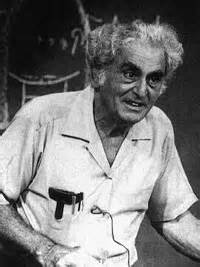 “My name is Julius Sumner Miller, and physics is my business.” That’s how he opened every show. Physics was his business. So was wonder.
“My name is Julius Sumner Miller, and physics is my business.” That’s how he opened every show. Physics was his business. So was wonder.
A longtime friend who attended school with my daughters and was a frequent visitor to our house, still keeps in touch though he lives most of the time in Southeast Asia. His email today included a link to a show he had rediscovered: Professor Julius Sumner Miller’s “Demonstrations in Physics.
I smiled as I watched the lesson on air pressure, a 14-minute delight of knowledge and unabashed enthusiasm. Dr. Miller’s show aired on PBS and was a staple in our house. We didn’t have cable, so my parents taped it for us. We all enjoyed them, but my oldest daughter, now a physicist herself, was the most faithful viewer.
Dr. Miller loved sharing the wonders of physics in the everyday world from air pressure, to heat conduction, to, one of our favorites, Bernoulli’s principle. His joy was contagious. For years, after my daughter disappeared into the basement to build and conduct her own experiments, she would call me down to demonstrate them and echoed two of Dr. Miller’s frequent expressions: “That’s beautiful. Let’s do it again” (and he and she would). If it didn’t go as planned, “Oh well, an experiment never fails. You just learn something you didn’t expect to learn.”
Those memories flooded back as I watched the episode this morning. Something else came to mind as well: What a gift to retain the wonder and abandon that are natural for children as we become adults. In addition to adding “enchantment to the soul,” as Miller said, it also opens the soul to receive Grace. We can’t see the extraordinary all around us if we aren’t present where we are, looking with open eyes and heart. Children are good at this.
In his book, Growing Young, anthropologist Ashley Montagu listed these qualities among others in the childlike nature: “…curiosity, inquisitiveness, thirst for knowledge, the need to learn, imagination, creativity, open-mindedness, experimental-mindedness, spontaneity, enthusiasm…joy…”
Along life’s path, many of us lose that childlike amazement at the world around us. Scientists like Montagu and Miller are not the only ones to understand the importance of such presence. Like Thornton Wilder said in “Our Town,” saints and poets do, some.
Watching Dr. Miller delight in how things work reminded me of Sts. Francis and Bonaventure extolling God’s presence in the “book of nature.” For Bonaventure, God is “fountain fullness,” spilling out of and over everything, in all life, outer as well as inner.
Most religious traditions see the Holy One reflected in creation, and creation as a way to encounter that Sacred. Rumi, the 13th century mystical poet of Islam wrote: “The beauty and grandeur of God belong to Him; the beauty and grandeur of the world of creation are borrowed from Him.”
For me, Dr. Miller’s physics was a call to prayer, a joyful time to marvel at some small part of creation and to soak up the Goodness flowing through it all.
Take a few minutes to feed the child within; watch an episode or two of Demonstrations in Physics. No matter what you believe, or not, about prayer, Presence, and creation, you’ll be delighted.

I don’t remember ever watching Dr. Miller’s demonstrations. I did study Physics in high school but that was because some said it would be easier than Chemistry. Since I have never studied Chemistry myself, I don’t know if that is true or not.
“The beauty and grandeur of God belong to Him; the beauty and grandeur of the world of creation are borrowed from Him.” (Rumi) I know that God is unknowable and I know that I have experienced some moments that can only be attributed to Presence. For me, it is difficult to express my experiences to those who might not understand miracles in the same way that I do. They are not just matters mentioned in the Bible, but mysterious, marvelous phenomena that happen today, if only personally, not publicly. (And infrequently)
Another Author, Abraham Heschel, suggested that we live each day “in radical amazement.” It is easier some days than others.
Thank you for bringing this scientist and these demonstrations to our attention.
You’re welcome. Hope you enjoy watching some. Abraham Heschel is one of my favorites, too.